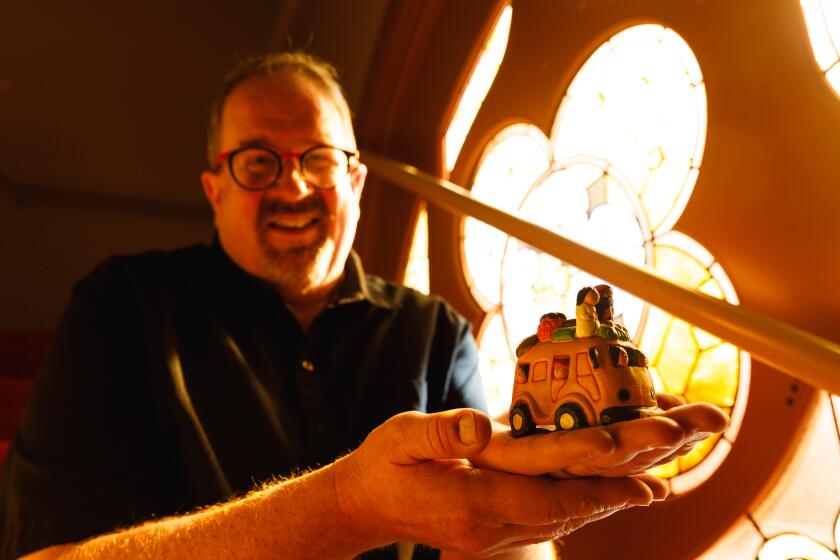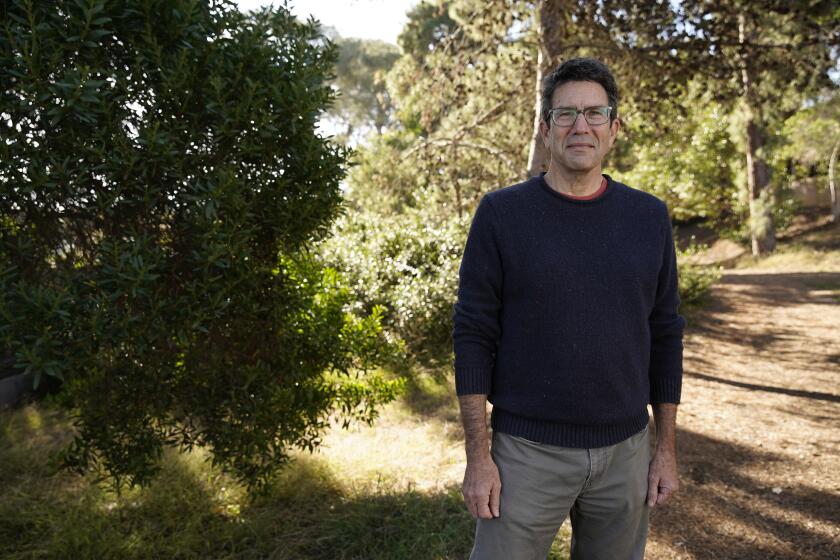Commentary: From the Old Testament, lessons from Moses on life’s disappointments

Moses knew frustration and failure — and how to lose with grace
He wanted to continue to be their leader. He wanted to see the fruit of his labors.
But it was not to be. Someone else was going to lead them home.
He could have thrown a public temper tantrum. He could have summoned his base and rallied them into an angry mob to riot against the decision. He could have refused to concede.
Instead, he blessed the people — and his successor — and encouraged them to continue to follow God’s lead.
Moses, as it turns out, could teach us a thing or two about how to live our lives right now — especially right now. Lessons about being a good loser, keeping our perspective, remembering our purpose and practicing resilience in the face of disappointment and frustration.
In case you need an introduction, Moses is the hero of the Torah, the first five books of the Hebrew Scriptures (Christianity’s Old Testament). He had firsthand encounters with God, freed the Israelites from bondage in Egypt, parted the Red Sea to help seal their escape, delivered the Lord’s Ten Commandments and led his people for 40 years in the desert wilderness as they searched for their Promised Land.
His story is the stuff of legends, chronicled in movies, books, songs and sermons.
But Moses also knew frustration and failure — including the ultimate one at the end of his life when he was not allowed to enter that Promised Land. And it’s how he handled these distresses thousands of years ago that have had an uncanny staying power for their relevance.
“We, whose lives are also a mix of fulfillment and disappointment, can learn from his experiences,” writes Rabbi Harold Kushner in “Overcoming Life’s Disappointments,” his book about how Moses coped with frustration. “If he could overcome his monumental disappointments, we can learn to overcome ours.”
Professor Brad Kelle, who teaches Old Testament and Hebrew at Point Loma Nazarene University, echoes this in his own studies of Moses. Throughout the story of his life, Moses encounters obstacles, nuisances, betrayal and the loss of loved ones. “And I think that alone is probably a significant point that this literature is making,” Kelle says. “Disappointment or failure or frustration is expected in life. So it’s not really a question of is this going to happen, but how are you going to respond to it.”
The right stuff
Since writing his seminal best-seller, “When Bad Things Happen to Good People,” Kushner has become famous for books that use biblical stories and God’s words to fashion spiritual tool boxes to fix what ails us. In his book on Moses, the retired rabbi from Massachusetts recounts how his years of shepherding the Israelites were often met with resentment rather than gratitude.
“He led the people from slavery to freedom; they complained that freedom was too demanding, too unpredictable,” Kushner writes. “He led them in the wilderness; they complained that the food was monotonous.”
What kept him from giving up in the midst of the whining and criticism?
“Moses always remembered who he worked for,” Kushner suggests. “He was not working to earn the thanks of the Israelites. He was not looking for compliments or appreciation (though he might well have welcomed them). He was working for God, obeying God’s call to bring the people out of Egypt, teach them how God wanted them to live, and guide them to the Promised Land.”
At one point, while Moses was meeting with God and being given the Ten Commandments, the people grew restless and melted down their metal to build an idol, a golden calf, to worship.
While the punishment was gruesome — the Bible says about 3,000 men were slain in retribution — Moses didn’t abandon the Israelites.
Kelle points to a passage in Exodus where Moses negotiates with God in their defense. “God sort of comes to Moses and says I’ll just leave them behind, like get rid of them, and I’ll sort of start over again with you,” Kelle says. “I’ll just give you a new group of people, and I’ll go forward with you.” Moses persuades God to relent.
These experiences of “seeing so many different kinds of disappointment and failure and frustration happening again and again” instilled a resilience in Moses, which allowed him to continually recover and move forward.
Kushner uses the golden calf story to teach this lesson: “We can and should set high standards for people, but at the same time we must be prepared to see them fall short of those high standards.”
Moses, he adds, “was wise enough to know that people will often disappoint you, that they will be weak and unreliable, that they will forget to thank you, but you must love them anyway ... because it is the right thing to do.”
The big disappointment
The reasons are too complicated to get into here, but when the Israelites finally reached the edge of the Promised Land, God told Moses that he would be barred from entering it. Moses didn’t like that decision, yet he put his energy into getting the people and Joshua, their new leader, ready to cross over the Jordan River and into their future.
“The book of Deuteronomy presents itself as being this final sermon by Moses that he gives to this new generation that has grown up in the wilderness,” says Kelle, noting that nearly all the people who left Egypt four decades earlier had died.
So why doesn’t Moses throw more of a fit? Partly, it’s because of how practiced he is with dealing with disappointment. “But also, at least as it’s presented in the story, he always recognizes this is about something other than himself. It’s about this people, and in the story it’s about what God is wanting to do for and with this people.”
Kelle points out that this lack of closure occurs multiple times in the Hebrew Scripture stories, where main characters die without seeing the fulfillment of the things for which they’ve lived their lives. “So there is a constant theme that it’s really about the journey and you’re a part of something that’s much larger than you and you may get to experience a piece of it but you may not get to experience the whole and that’s OK.”
Kushner says Moses was a testimony to the ethic of humility. “Humility,” he writes, “means recognizing that you are not God and it is not your job or responsibility to run the world.”
Ancient relevance
Professor Kelle, who also is an ordained Nazarene minister, is not surprised at the staying power of these ancient texts. “We read the Bible because it tells us something about what it means to be human and how human beings live in the world — good, bad and ugly.”
So what would Moses say to folks who resist wearing masks to help flatten the cure of this raging COVID-19 pandemic? “I think Moses would say this isn’t about you. There’s something larger going on. There’s a community and people who have got to be preserved.”
What does Moses teach us about how to be a good loser?
“There is a larger perspective that is taken here,” Kelle says. He repeats a theme that crops us throughout the passages. “Moses, with very little fight, says there is something bigger than me that’s going on here, something more important than me.”
He adds: “There is this element of understanding that it’s not about him. He is simply an instrument in this.”
In the end, Moses gets to go up on a mountaintop and survey from a distance the expanse of the Promised Land. Then he dies and God buries him in an unmarked grave. (An aside: the Rev. Martin Luther King Jr., whose holiday honoring his birth and life as a civil rights leader is tomorrow, invoked this mountaintop imagery in his final speech, delivered the day before he was assassinated.)
As for Moses’ life, the Bible says this: “Since then no prophet has risen in Israel like Moses, whom the Lord knew face to face.”
Moses, as it turns out, also could teach us a thing or two about our own legacies.
Dolbee is the former religion and ethics editor of The San Diego Union-Tribune and a former president of the Religion News Association. Email: SandiDolbeecolumns@gmail.com.
Get Essential San Diego, weekday mornings
Get top headlines from the Union-Tribune in your inbox weekday mornings, including top news, local, sports, business, entertainment and opinion.
You may occasionally receive promotional content from the San Diego Union-Tribune.




